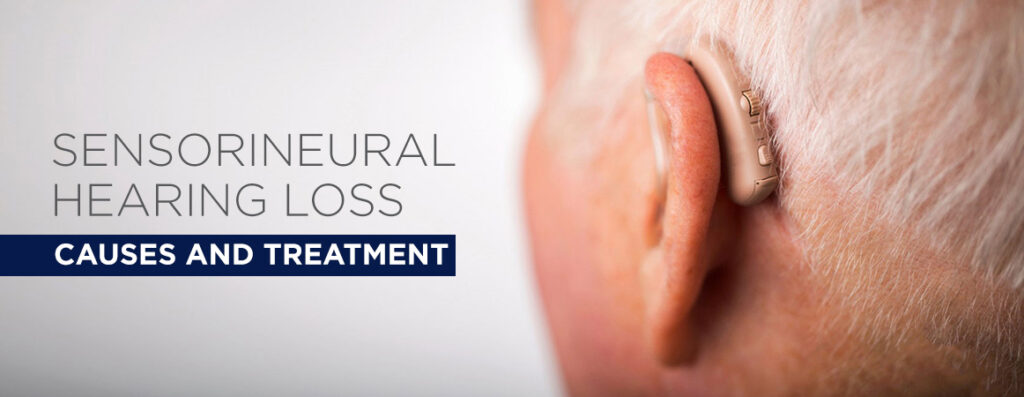Sensorineural Hearing Loss: Causes and Treatment
Sensorineural hearing loss is often characterized by a gradual decline in hearing sensitivity, difficulty understanding speech, tinnitus (ringing in the ears), and a sensation of fullness or pressure in the ears. It can also lead to challenges in discerning high-pitched sounds and may, in some cases, be accompanied by balance problems if the vestibular system is affected. While sensorineural hearing loss is typically irreversible, early detection and intervention can significantly improve management and quality of life for affected individuals.
What is Sensorineural Hearing Loss?
Sensorineural hearing loss is often referred to as nerve-related hearing loss. It occurs when the delicate hair cells within the inner ear or the auditory nerve itself become damaged or dysfunctional. Unlike conductive hearing loss, which involves problems with the ear canal, eardrum, or middle ear bones, sensorineural hearing loss pertains to issues within the inner ear or the auditory nerve pathways to the brain.
Causes of Sensorineural Hearing Loss
Several factors can contribute to sensorineural hearing loss, ranging from genetic predispositions to environmental influences:
- Aging: Age-related hearing loss, known as presbycusis, is a common cause of sensorineural hearing loss. Over time, the delicate structures of the inner ear naturally deteriorate, leading to decreased hearing sensitivity.
- Noise Exposure: Prolonged exposure to loud noises, whether in the workplace, during recreational activities, or from environmental sources, can damage the hair cells in the inner ear, resulting in permanent sensorineural hearing loss.
- Genetic Factors: Certain genetic mutations can predispose individuals to sensorineural hearing loss. These genetic abnormalities may affect the development or function of the inner ear structures, leading to hearing impairment from birth or later in life.
- Medical Conditions: Various medical conditions, including autoimmune disorders, meningitis, Meniere’s disease, and otosclerosis, can cause sensorineural hearing loss by damaging the inner ear structures or affecting the auditory nerve.
- Medications and Ototoxic Substances: Certain medications and chemicals, known as ototoxic substances, can harm the delicate structures of the inner ear, leading to sensorineural hearing loss as a side effect.
Symptoms of Sensorineural Hearing Loss
Sensorineural hearing loss can manifest in various ways, depending on the severity and underlying cause:
- Gradual or sudden decrease in hearing sensitivity
- Difficulty understanding speech, especially in noisy environments
- Tinnitus, or ringing in the ears
- Sensation of fullness or pressure in the ears
- Difficulty discerning high-pitched sounds
- Balance problems, in some cases, if the vestibular system is affected
Treatment Options for Sensorineural Hearing Loss
While sensorineural hearing loss is often irreversible, several treatment options can help individuals manage their condition and improve their quality of life:
- Hearing Aids: Hearing aids are the most common treatment for sensorineural hearing loss. These devices amplify sound and can be tailored to the individual’s specific hearing needs, helping to enhance speech clarity and overall auditory perception.
- Cochlear Implants: For individuals with severe to profound sensorineural hearing loss who do not benefit from hearing aids, cochlear implants may be recommended. These surgically implanted devices bypass the damaged inner ear structures and directly stimulate the auditory nerve, providing a sense of sound.
- Assistive Listening Devices: Assistive listening devices, such as FM systems and Bluetooth accessories, can complement hearing aids and cochlear implants by improving speech comprehension in challenging listening situations, such as classrooms or meetings.
- Auditory Training: Auditory training programs can help individuals with sensorineural hearing loss improve their speech understanding and communication skills by training the brain to better process auditory signals.
- Lifestyle Modifications: Making lifestyle changes, such as avoiding exposure to loud noises, quitting smoking, and managing underlying medical conditions, can help prevent further hearing deterioration and promote overall ear health.
Conclusion:
Sensorineural hearing loss is a multifaceted condition with various hear loss causes and manifestations. Early detection and intervention are crucial for minimizing its impact on daily life. By understanding the causes, recognizing the hear loss symptoms, and exploring available hear loss treatment options, individuals with sensorineural hearing loss can take proactive steps towards better hearing health and improved quality of life.
Post Disclaimer
The information contained in this post is for general information purposes only. The information is provided by "Sensorineural Hearing Loss: Causes and Treatment "and while we endeavour to keep the information up to date.
Legal Disclaimer
We do not claim to cure any disease which is considered’ incurable ‘ on the basis of scientific facts by modern medicine .The website’s content is not a substitute for direct, personal, professional medical care and diagnosis. None of the medicines mentioned in the posts ,including services mentioned at "medicineguide.us" should be used without clearance from your physician or health care provider.
Testimonials Disclaimer– : Results may vary, and testimonials are not claimed to represent typical results. The testimonials are real, and these patients have been treated with homeopathy treatment from our clinic . However, these results are meant as a showcase of what the best, Medicine can do with their disease contions and should not be taken as average or typical results.


